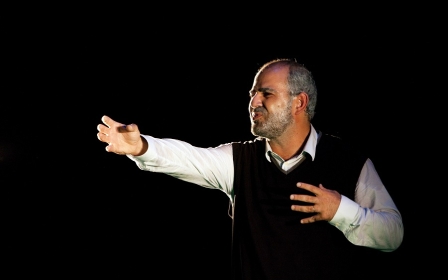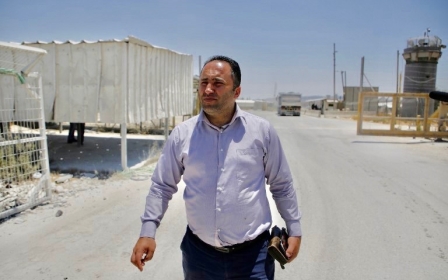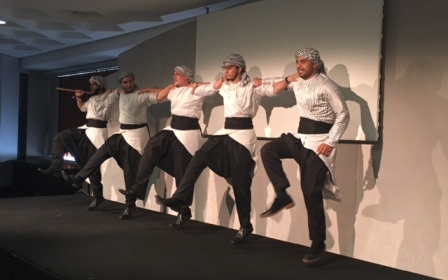Palestinian Authority crackdown on media raises alarm among journalists

Journalists and media rights activists have warned that the arrest of a journalist by the Palestinian security forces last week points to new attempts to drastically restrict journalism in the West Bank.
Jihad Barakat, a journalist with the Palestine Today channel, was arrested on Friday near a checkpoint in Tulkarem after filming the convoy of the Prime Minister, Rami Hamdallah.
According to a statement from Addameer, a prisoners’ rights group providing legal representation to Barakat, he was arrested by the Palestinian preventative security force, and was held without access to lawyer until Saturday morning.
“Despite attempts by Addameer’s attorney to obtain information about him and to visit him since his arrest, the legal advisor in Tulkarem denied that Barakat was seized by PA security forces,” the statement read.
After his lawyer was allowed access, he was released on bail on Sunday, but is due to face trial in September on a varied list of charges.
These include “behaving in a manner contrary to the manners of a public place,” “panhandling” and “presence in a place in time or conditions from which it is inferred that the presence is illegal or improper”.
Barakat is not the only West Bank journalist to be recently arrested. A cameraman for Al Aqsa TV, a Hamas-linked station, is still in detention after being arrested on 1 July. Taher al-Shamali was detained, and then released, in June after using Facebook to criticise Jibril Rajoub, a powerful politician.
“Since the beginning of June, when Trump met with [PA President Mahmoud] Abbas and there was the conference in Saudi Arabia, we have seen a big increase in the violations against journalists," said Omar Nazzal, head of the Palestinian Journalists’ Union.
"In June, for the first time, the number of violations the PA committed against journalists was triple that the number the Israelis committed.”
Other journalists told MEE that the situation had become worse recently for journalists in the West Bank, and the result of this was increasing self-censorship.
One West Bank journalist, who asked not to be named in order to discuss the matter without fear of reprisal, said he is now scared to do his job.
“I’m so afraid of putting anything on social media now,” he said. “And I’m so careful about making stories in what might be sensitive locations, such as Balata refugee camp.”
He said he felt anything could lead to arrest, citing colleagues who had been arrested for social media postings, as well as stories they had filed.
“The arrests of journalists are not legal under Palestine’s basic laws,” said Musa al-Rimawi, coordinator of the Palestinian Center for Development and Media Freedoms (MADA). “The reason appears to be the split between Fatah and Hamas, but we are demanding that journalists be left out of this tension."
Rimawi also pointed to the recent blocking of 29 websites in the West Bank and a recently passed “Electronic Crimes” law whose provisions have not been made public as additional indicators of a shrinking space for the press.
“It’s really scary that they didn’t publish the law – this has led to fear and worry in civil society,” Rimawi said.
'A violation of the law'
Palestinian journalists have long faced harassment and arrest by the Israeli authorities. Gazan journalists also face severe restrictions on their freedom of expression from Hamas, the de facto rulers of the besieged enclave. One Gazan journalist is currently imprisoned by Hamas.
But the Electronic Crimes law has brought worries over press freedom in PA-controlled areas to new heights.
“The PA passed this law without even discussing it with the journalists who will be most affected by it,” said Nazzal. “This is in itself a violation of the law.”
The first websites were blocked by the PA on 12 June, with more following in the days after. All those affected are perceived as being close to Hamas or Mohammed Dahlan, an exiled Fatah rival of Abbas.
Among the blocked websites is Quds News Network, a popular outlet that describes itself as objective and youth-driven.
Iyad al-Rifai, the head of the Quds News Network, told MEE that his company had not received any warning of the decision to block the website in the West Bank.
“We haven’t received any formal decision to ban our website, and we don’t know officially who’s behind it. But we learnt from internet companies that the decision came from the Attorney General.”
Rifai said the company had filed an appeal against the block, and was looking at technical solutions that may allow them to work around it.
The violations of the PA have become much bigger than those of the Israelis
- Musa al-Rimawi, Palestinian Center for Development and Media Freedoms
The office of the Attorney General did not respond to a request for comment when contacted by MEE.
Unpopular leadership
A Palestinian official told the Maan news agency that the websites had been blocked for publishing false news, and that cases were pending against them.
“The violations of the PA have become much bigger than those of the Israelis,” said al-Rimawi. “We are really worried about freedom of expression in Palestine.”
The term of the Palestinian president, Abbas, was supposed to end in 2009, but the split between Fatah in the West Bank and Hamas in Gaza has meant that no national elections have been held since 2005.
A March study by the Palestinian Centre for Policy and Survey Research showed 64 percent of Palestinians support his resignation.
As the president has grown increasingly unpopular, Palestinian security forces have clamped down on those they view as political opponents, particularly those associated with Hamas or Dahlan.
“It is very clear that regional developments mean the PA has had to commit to a new political path,” said Nazzal. “This means that they have to oppress any voice that opposes their policy.”
Middle East Eye propose une couverture et une analyse indépendantes et incomparables du Moyen-Orient, de l’Afrique du Nord et d’autres régions du monde. Pour en savoir plus sur la reprise de ce contenu et les frais qui s’appliquent, veuillez remplir ce formulaire [en anglais]. Pour en savoir plus sur MEE, cliquez ici [en anglais].




